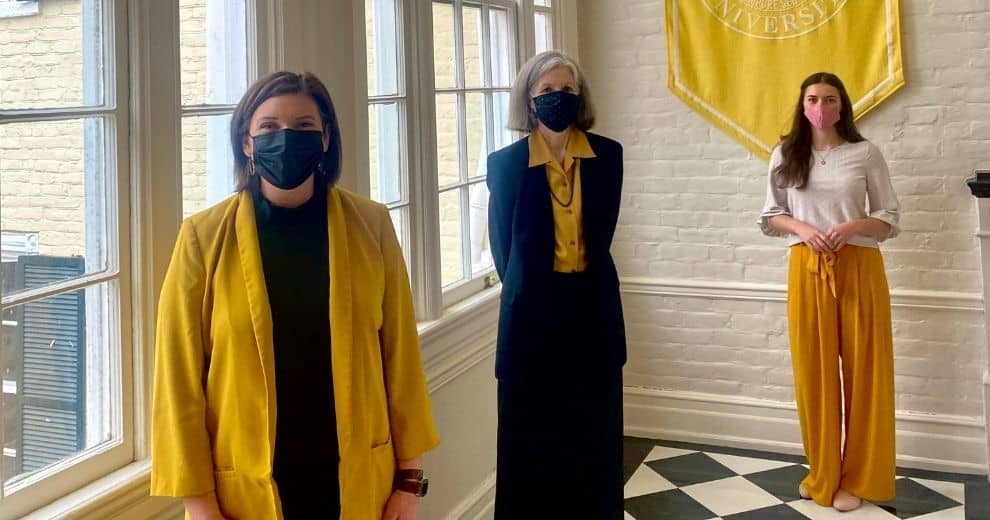The COVID-19 pandemic has stretched and tested the MBU family in ways we never could have imagined. Nevertheless, students demonstrated remarkable resilience in adapting to a new way of campus life and facing down their own personal challenges, be it the loss of a family member to COVID, contracting the virus themselves, or figuring out how to pay for college in a financial landscape that looks dramatically different from pre-pandemic days.
While the Student Health Center and Counseling Services supported students through physical and mental health challenges wrought by the pandemic, MBU’s Office of Financial Aid and its professional staff of four provided another invaluable source of support and stability throughout an otherwise turbulent year.

Financial factors
Virtually all MBU students receive some form of financial assistance to help them pay for college. The typical aid package for an undergraduate includes merit scholarships as well as need-based aid. While MBU aid packages are generous, many students also rely on low-interest student loans and additional outside scholarships to cover their total cost of attendance.
A student’s financial aid is based largely on their family’s income, so as the pandemic took hold of not only our health but our economy, college students everywhere began to ask: can I afford to stay in school?
‘Hard, tragic situations’
As the economic impact of the pandemic began to trickle down, the phone calls and emails started flowing into the financial aid office.
The most common concern: loss of income due to job loss. Whether it was a family member contracting COVID and unable to work, the elimination of a position, or even the closure of a family-owned business, the pandemic struck MBU families without discrimination. In some cases, it was an extended illness or caregiving needs that forced a parent to leave their job. Still others were dealing with major medical bills.
“Our students and their families were facing some incredibly hard, tragic situations. Of course we wanted to support them in any way we could,” said Megan Speth, director of financial aid.

(top row, l-r) Robin Dietrich, senior financial advisor; Jennifer Eibert, assistant director of financial aid; (bottom row, l-r) Megan Speth, director of financial aid; Carol Waldmann, associate director of financial aid and technology services
Finding options
While the federal government uses a family’s income information from two years prior to determine aid for the current academic year, financial aid professionals have the ability to review and make adjustments to aid packages on a case-by-case basis at any time during the year.
The first step was making sure that amid the chaos of departing campus abruptly, adapting to remote learning, and readjusting to life at home last spring, MBU students whose finances were affected by COVID knew adjustments were possible and to contact the Office of Financial Aid. Information was shared on MBU’s COVID FAQ page, financial aid website, and via counselors and advisors.
Once a student initiates a request for additional aid, MBU’s financial aid team looks at two key factors:
- Has the student already accepted all of the aid available to them?
- Are there extenuating circumstances (usually a change of income) that merit additional aid?
As each student’s situation is unique, financial aid counselors work one-on-one with families to determine what options are available to them and the best approach to help them continue funding their degree, working within the requirements of the U.S. Department of Education (DOE). Once a plan is decided upon, MBU staff work with families to help them complete the necessary paperwork and documentation — most often the DOE’s Change of Income form — process their revised aid application, and make sure they understand their new aid package.
Personal touch makes all the difference
Processing one Change of Income application can take anywhere from two to six hours for an MBU financial aid staff member, depending on the situation. The Office of Financial Aid estimates that it has handled more than 50 since spring of 2020, more than double the typical number.
This type of effort combines with a service-minded approach to set MBU’s Office of Financial Aid apart from its peers.
“The thing that parents and students seem to appreciate the most is that we are real people who actually talk to them and work with them. We’re not just directing students to a website and when they call, they get a human being, not a recording or a generic helpline,” noted Speth.
It is not uncommon for parents to tell MBU staff that their financial aid experience with the universities attended by their other children was not as positive and they were never as helpful. MBU’s financial aid professionals also report that many parents are often just grateful that someone is taking the time to explain their options and the process, which is especially important to first generation college students and their families.
“We take being a part of the MBU family very seriously, and families support each other. If a student or family is struggling financially during the pandemic, we want them to know they can come to us, we will keep circumstances confidential, and we will do everything in our power to help keep their student on track for their degree,” concluded Speth.